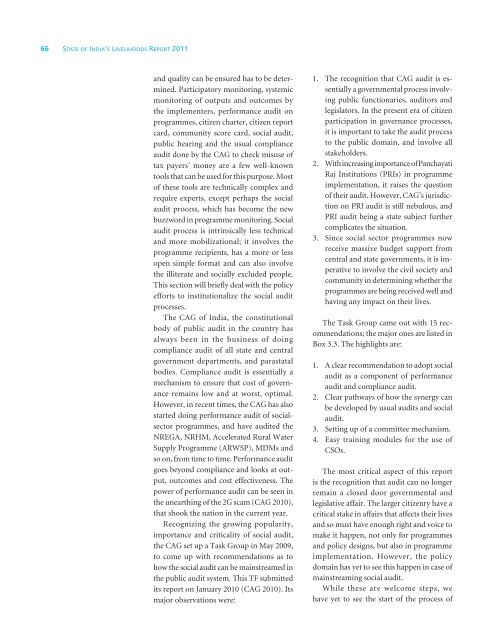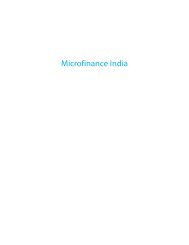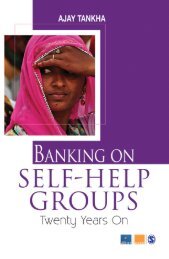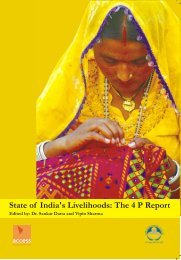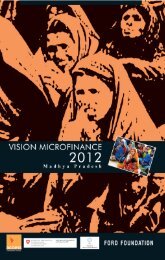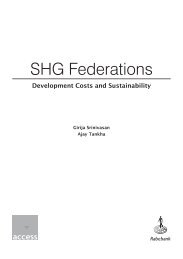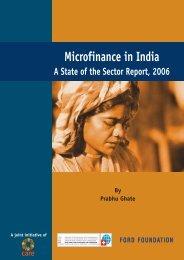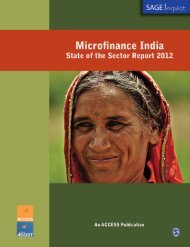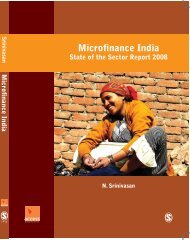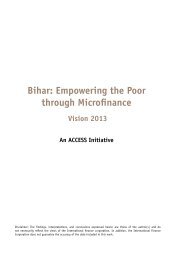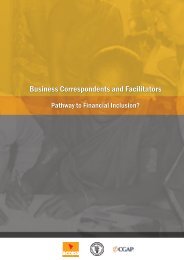SOIL Report 2011 - ACCESS Development Services
SOIL Report 2011 - ACCESS Development Services
SOIL Report 2011 - ACCESS Development Services
- No tags were found...
Create successful ePaper yourself
Turn your PDF publications into a flip-book with our unique Google optimized e-Paper software.
66 State of India’s Livelihoods <strong>Report</strong> <strong>2011</strong>and quality can be ensured has to be determined.Participatory monitoring, systemicmonitoring of outputs and outcomes bythe implementers, performance audit onprogrammes, citizen charter, citizen reportcard, community score card, social audit,public hearing and the usual complianceaudit done by the CAG to check misuse oftax payers’ money are a few well-knowntools that can be used for this purpose. Mostof these tools are technically complex andrequire experts, except perhaps the socialaudit process, which has become the newbuzzword in programme monitoring. Socialaudit process is intrinsically less technicaland more mobilizational; it involves theprogramme recipients, has a more or lessopen simple format and can also involvethe illiterate and socially excluded people.This section will briefly deal with the policyefforts to institutionalize the social auditprocesses.The CAG of India, the constitutionalbody of public audit in the country hasalways been in the business of doingcompliance audit of all state and centralgovernment departments, and parastatalbodies. Compliance audit is essentially amechanism to ensure that cost of governanceremains low and at worst, optimal.However, in recent times, the CAG has alsostarted doing performance audit of socialsectorprogrammes, and have audited theNREGA, NRHM, Accelerated Rural WaterSupply Programme (ARWSP), MDMs andso on, from time to time. Performance auditgoes beyond compliance and looks at output,outcomes and cost effectiveness. Thepower of performance audit can be seen inthe unearthing of the 2G scam (CAG 2010),that shook the nation in the current year.Recognizing the growing popularity,importance and criticality of social audit,the CAG set up a Task Group in May 2009,to come up with recommendations as tohow the social audit can be mainstreamed inthe public audit system. This TF submittedits report on January 2010 (CAG 2010). Itsmajor observations were:1. The recognition that CAG audit is essentiallya governmental process involvingpublic functionaries, auditors andlegislators. In the present era of citizenparticipation in governance processes,it is important to take the audit processto the public domain, and involve allstakeholders.2. With increasing importance of PanchayatiRaj Institutions (PRIs) in programmeimplementation, it raises the questionof their audit. However, CAG’s jurisdictionon PRI audit is still nebulous, andPRI audit being a state subject furthercomplicates the situation.3. Since social sector programmes nowreceive massive budget support fromcentral and state governments, it is imperativeto involve the civil society andcommunity in determining whether theprogrammes are being received well andhaving any impact on their lives.The Task Group came out with 15 recommendations;the major ones are listed inBox 3.3. The highlights are:1. A clear recommendation to adopt socialaudit as a component of performanceaudit and compliance audit.2. Clear pathways of how the synergy canbe developed by usual audits and socialaudit.3. Setting up of a committee mechanism.4. Easy training modules for the use ofCSOs.The most critical aspect of this reportis the recognition that audit can no longerremain a closed door governmental andlegislative affair. The larger citizenry have acritical stake in affairs that affects their livesand so must have enough right and voice tomake it happen, not only for programmesand policy designs, but also in programmeimplementation. However, the policydomain has yet to see this happen in case ofmainstreaming social audit.While these are welcome steps, wehave yet to see the start of the process of


